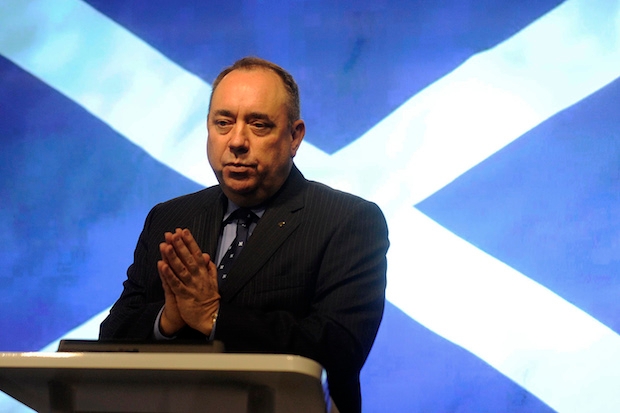Personally, I’m now waiting for the Queen to get involved.
After all, there’s not much left of Alex Salmond’s independence-but-not-independence blueprint that is left intact. First it was his ‘we’re going to share the pound in a Sterling zone’ claim. That was ruled out by George Osborne (and Ed Balls and Danny Alexander) last week.
Then it was his ‘independence in Europe’ claim, and that was dismantled by Jose Manuel Barroso today. The only pillar of Salmond’s grand ‘everything’s-going-to-remain-the-same-only-different’ scheme which remains in place is a shared monarchy.
So it can’t be long before Her Majesty also intervenes and says: ‘Do you know what? I don’t much like the idea of being monarch of an independent Scotland, I think I’ll opt out of that too.’
For months, the referendum debate has been chugging along, the same old arguments have been explored without much to get anybody really interested. Then, kaboom, in just a few days, everything has changed. Ever since the campaign started two years ago, thousands of Scots have demanded clarity and certainty. What is going to happen to the pounds in our pockets? They have cried. What’s going to happen to our place in Europe? They have asked.
Well, now they know and this is really what has changed in the last few days: Scots have been told that an independent Scotland will actually have to be independent. It will not be the ‘same-but-slightly-different’ vision that Salmond has painted for so long.
An independent Scotland will be independent. It will have to have its own currency – whether or not that can be pegged to the UK pound – and Scotland will be stranded outside the EU, probably for years and possibly even for decades.
The Nationalists could – and did – dismiss this warning when it came from the Chancellor over the currency last week. But now that we have had a cold, hard dose of reality from the President of the European Commission, the truth of the situation is really starting to sink in.
There has undoubtedly been a feeling in Scotland that voting Yes didn’t carry much of a risk. We would still be attached to the UK, at least in part. We would have the same currency, we would be able to rely on the Bank of England to bail us out if we got into trouble and we would still be in the EU so could trade as normal with everyone.
But now, all that has changed. The independence debate has shifted. It has moved on, substantially so. Everything has become starker and it now should be clear to everyone in Scotland just how high the stakes are.
Mr Barroso’s intervention this morning on the Andrew Marr Show would have been significant at any time but coming, as it did, just after the Chancellor’s dismissal of a shared currency after independence, it had real weight.
Just for the record, let’s have a look at what he actually said: “In case there is a new country, a new state, coming out of a current member state, it will have to apply and – this is very important – the application and the accession to the European Union, will have to be approved by all the other member states of the European Union.”
And he added: “I don’t want to interfere on your referendum here and your democratic discussion here but of course, it will be extremely difficult to get the approval of all the other member states to have a new member coming from another member state.
“We have seen, for instance, Spain is opposing even the recognition of Kosovo so it’s, to some extent, a similar case, because it’s a new country and so I believe it’s going to be extremely difficult, if not impossible, a new member state coming out of one of our member countries, getting agreement of the others.”
Now, there will be many people out there willing to criticise Mr Barroso. After all, he is not a much-loved figure in the UK – being Europe’s top bureaucrat and all.
But if there is someone who knows how Europe works, it is him.
He knows that every country in Europe has its own agenda and, if it suits that country to use its veto on Scottish membership as a bargaining chip for something else, then that is what is going to happen.
This time last week, Scottish independence looked, to many north of the border, like the best of both worlds. Scotland could keep the best things of being British, including the pound and the monarchy, and take on the best things about being independent – making Scottish decisions at a Scottish level.
But now it looks very different. Independence suddenly looks as if it would actually mean what it says on the tin. It would mean estrangement, separation, divorce and, following Mr Barroso’s intervention, isolation as well.
The Nationalists expect a substantial number of Scots to take such umbrage with this supposed ‘bullying’ from the EC and the UK Government that they will join the Yes campaign.
That may be right but there will also be a lot of voters who will go the other way, frightened by the reality of what independence will actually mean.
So, while no-one quite knows how all this is going to pan out in percentage terms for each side, what is certain is that the debate is now definitely more polarised than it has been up until now. It is harsher, it has more edge but it is, at last, rooted in reality.
And that, in the end, is probably no bad thing.






Comments